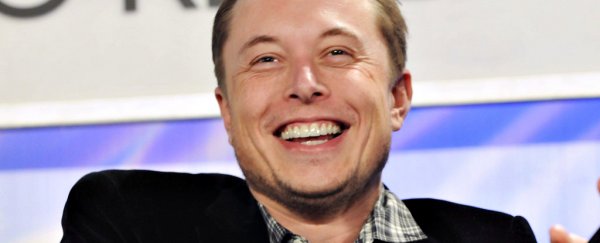Since September, the Australian state of South Australia has suffered a string of blackouts, which has triggered fierce political debate over the state's dependence on renewable energy, and how to avoid the problem going forward.
Now, Tesla founder Elon Musk has stepped up to save the day with an offer that sounds too good to refuse - he says he can fix the state's energy problems by installing a network of Tesla's Powerwall 2 batteries, all in 100 days or he'll provide all the technology for free.
The official offer was made by Tesla's vice president for energy products Lyndon Rive during meetings with Australian politicians and industry leaders this week, and made public on Twitter by Musk himself - just in case anyone thought he wasn't serious.
legend! ☀️ You’re on mate. Give me 7 days to try sort out politics & funding. DM me a quote for approx 100MW cost - mates rates!
— Mike Cannon-Brookes 👨🏼💻🧢🇦🇺 (@mcannonbrookes) March 10, 2017
The wager is this - Tesla will install 100 megawatt hours worth of Powerwall 2 battery storage within 100 days of signing a contract, and if it doesn't fix the blackouts, they'll do the whole project (worth an estimated US$25 million) for free.
South Australia is one of the sunniest and windiest parts of Australia, and is already the country's biggest user of renewable energy.
But renewable energy sources don't deliver equally year-round, and right now the state's grid has no way of storing surplus electricity for when it's needed.
Because of this, electricity supply doesn't always match up with periods of intense demand, which can lead to blackouts during extreme weather periods such as heatwaves - something Australia is poised to see more of after a record-breaking summer.
Or in the case of September's blackouts, when there was storm damage to the grid, there's not always enough renewable energy on hand to power the state rapidly in an emergency.
The dilemma has some groups suggesting we install more fossil fuel power plants to provide a back-up for renewables in future.
Another solution could be finding an efficient way to store up renewable energy during times of surplus - when there's more wind, solar, and geothermal energy being produced than the grid can use up, so it goes to waste.
A storage solution, such as a network of Powerwall 2 batteries, could make energy supply more reliable and evenly priced, and protect against high periods of demand and grid failures, which is what Rive was here to talk to the Australian government about.
After catching wind of the offer, entrepreneur Mike Cannon-Brookes, the co-founder of Australian-founded software company Atlassian, took to Twitter to ask Musk how serious he was about the offer.
Lyndon & @elonmusk - how serious are you about this bet? If I can make the $ happen (& politics), can you guarantee the 100MW in 100 days? https://t.co/av38xcizNo
— Mike Cannon-Brookes 👨🏼💻🧢🇦🇺 (@mcannonbrookes) March 9, 2017
Musk tweeted back: "Tesla will get the system installed and working 100 days from contract signature or it is free. That serious enough for you?"
Musk also quoted a price of US$250 per kilowatt hour for the 100 megawatt hour systems, which means it would cost the state around US$25 million plus installation for the battery packs if they work as promised.
There's no official word as yet on whether the government will be taking Musk up on the offer, but several politicians have shown serious interest.
"The government stands ready through ARENA and the CEFC to work with companies with serious proposals to support the deployment of more storage," Environment and Energy Minister Josh Frydenberg said in an email to Reuters.
ARENA is the Australian Renewable Energy Agency and the CEFC is the Clean Energy Finance Corp.
But there are also talks in progress with other battery providers, so we can't get too excited just yet.
"We have been talking with a number of large-scale battery providers about potential storage solutions, including in South Australia. To the extent Tesla is interested, we'll also talk with them," Clean Energy Finance Corp Chief Executive Oliver Yates said in an emailed statement.
Still, as far as we're concerned, when you get a money-back guarantee from the man who's delivered renewable rockets and is planning to send humans back to the Moon, it's probably something you should take up.
Watch this space.
